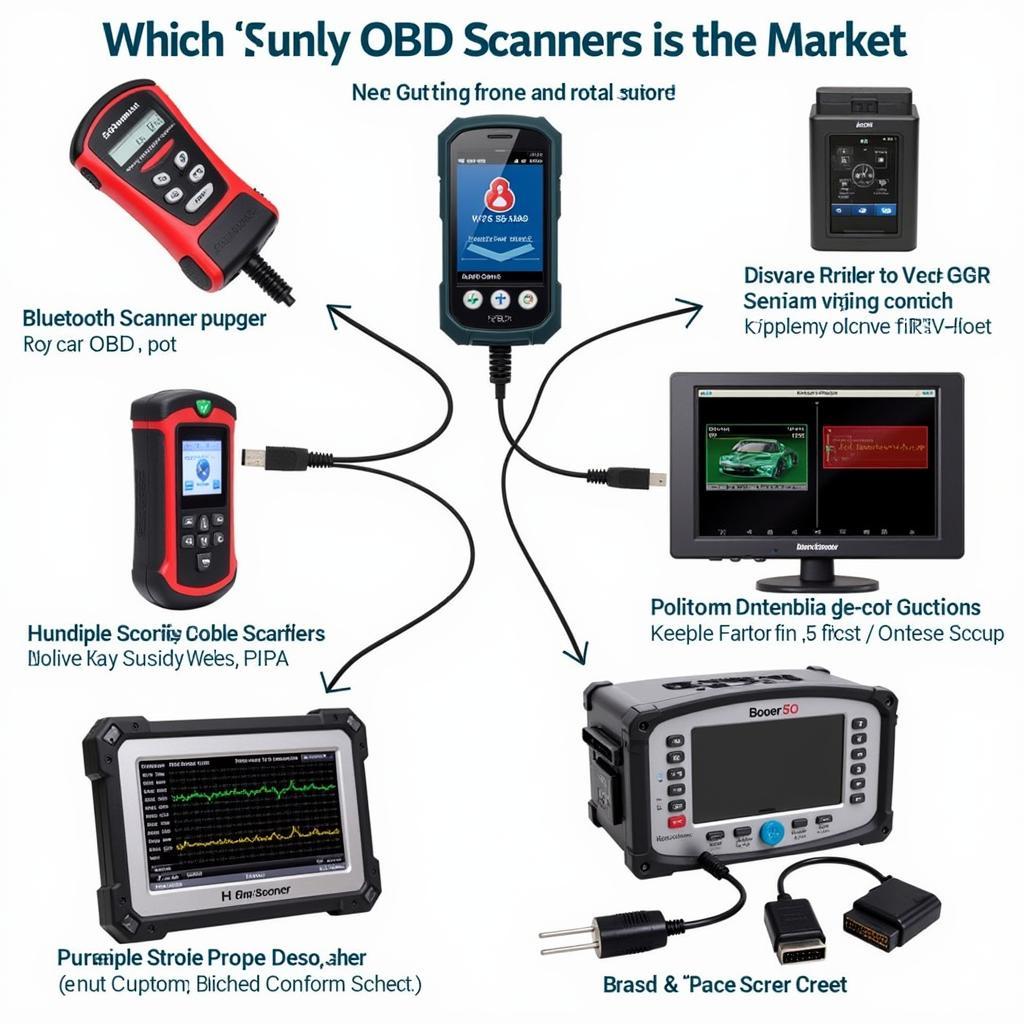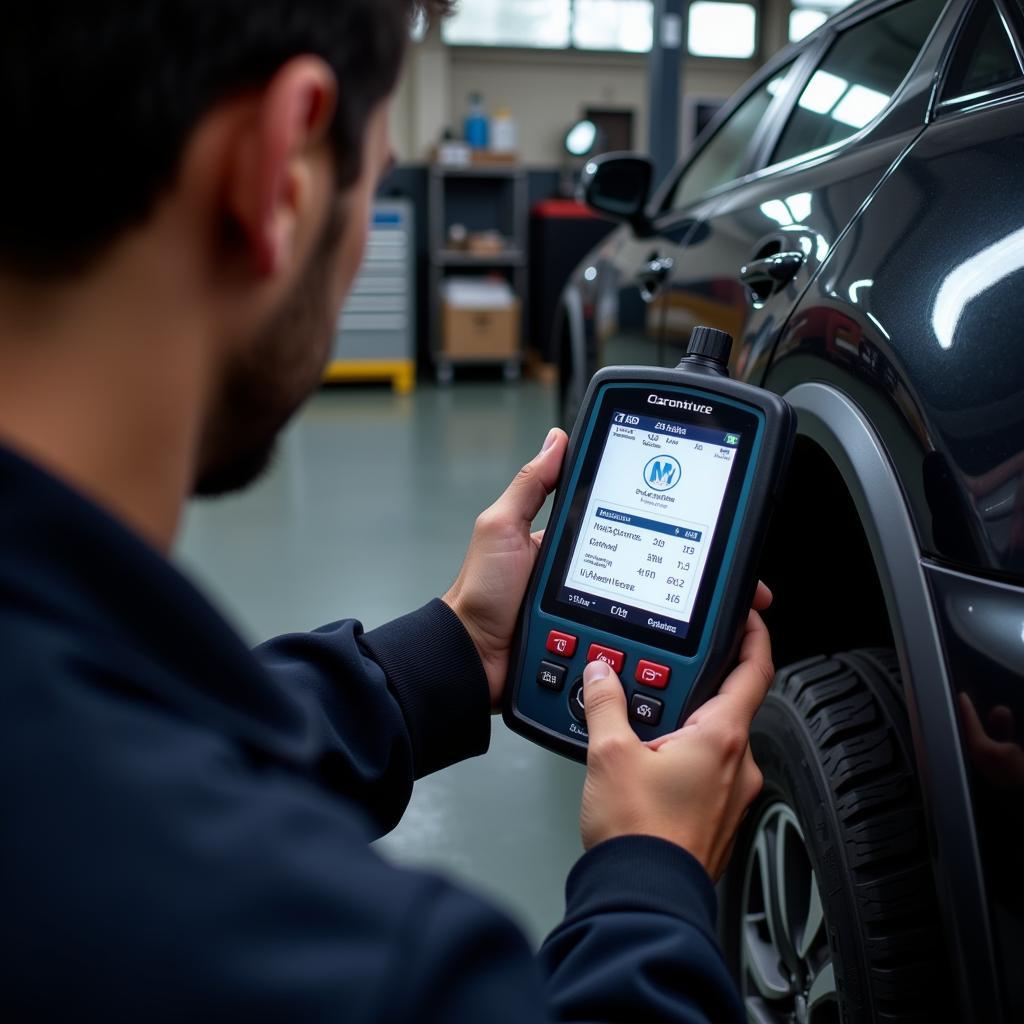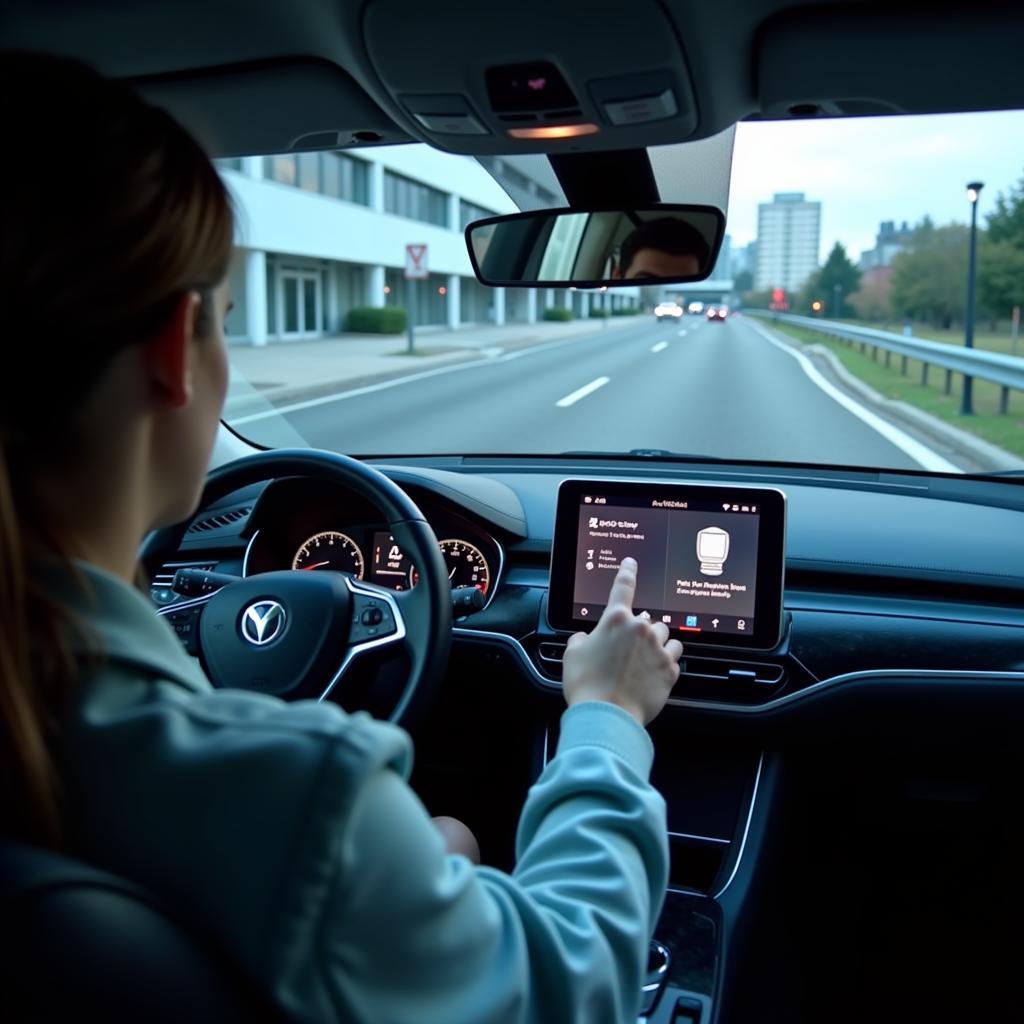In today’s digital age, even our cars are equipped with advanced technology. Gone are the days when mechanics relied solely on their intuition and experience to diagnose car problems. With the advent of onboard diagnostic tools, commonly known as OBD scanners, troubleshooting car issues has become more precise and efficient. This comprehensive guide delves into the world of OBD scanners, helping you understand their importance, types, and how to choose the best one for your needs.
 Different Types of OBD Scanners
Different Types of OBD Scanners
Understanding Onboard Diagnostic Tools
An onboard diagnostic tool, or OBD scanner, is a device that connects to your car’s onboard computer, allowing you to access data from the Engine Control Unit (ECU). This data provides valuable insights into the performance of your vehicle’s engine and other critical systems. The ECU constantly monitors various sensors throughout your car, detecting any abnormalities or malfunctions. When a problem arises, the ECU generates a Diagnostic Trouble Code (DTC), a unique code that represents the specific issue. An OBD scanner retrieves these DTCs, allowing you to understand the root cause of the problem.
Why You Need an OBD Scanner
Owning an bikescan-100 diagnostic tool can be incredibly beneficial for both car owners and professional mechanics.
For Car Owners:
- Early Problem Detection: An OBD scanner can help you detect minor issues before they escalate into major, costly repairs.
- Cost Savings: By identifying problems yourself, you can save money on unnecessary mechanic visits and potentially fix some issues on your own.
- Increased Knowledge: Using an OBD scanner empowers you with knowledge about your car’s health, allowing you to make informed decisions regarding maintenance and repairs.
For Mechanics:
- Faster Diagnosis: OBD scanners significantly reduce diagnostic time, enabling mechanics to pinpoint issues quickly and efficiently.
- Improved Accuracy: By providing precise data, OBD scanners help eliminate guesswork and ensure accurate repairs.
- Enhanced Professionalism: Utilizing advanced diagnostic tools demonstrates professionalism and builds customer trust.
Types of OBD Scanners
The market offers a wide range of OBD scanners, each tailored to different needs and budgets. Understanding the different types is crucial for choosing the best tool for your specific requirements.
1. Code Readers
As the name suggests, code readers are basic OBD scanners designed to read and clear DTCs. They are an affordable and user-friendly option for car owners who want to get a basic understanding of their vehicle’s health.
2. Handheld Scanners
Handheld scanners are more advanced than code readers, offering additional features like live data streaming, freeze frame data, and the ability to view manufacturer-specific codes. They are a popular choice for both car enthusiasts and professional mechanics.
3. Bluetooth Scanners
Bluetooth scanners connect wirelessly to your smartphone or tablet, allowing you to view diagnostic data on your device. These scanners are becoming increasingly popular due to their convenience and portability.
4. Professional-Grade Scanners
Professional-grade scanners are the most sophisticated type of OBD scanner, offering a comprehensive range of features, including advanced diagnostics, programming capabilities, and access to manufacturer-specific data. These scanners are typically used by dealerships and specialized repair shops.
 Professional-Grade OBD Scanner in Use
Professional-Grade OBD Scanner in Use
Choosing the Best OBD Scanner
Selecting the Best Onboard Diagnostic Tool depends on your individual needs and budget. Here are some factors to consider:
1. Vehicle Compatibility:
Ensure that the scanner you choose is compatible with your car’s make, model, and year. Some scanners are designed for specific car brands, while others offer broader compatibility.
2. Features:
Consider the features that are important to you. Do you need a basic code reader, or do you require advanced features like live data streaming and bi-directional control?
3. User Interface:
Choose a scanner with a user-friendly interface that is easy to navigate and understand.
4. Budget:
OBD scanners range in price from affordable code readers to expensive professional-grade scanners. Set a budget beforehand and choose a scanner that offers the best value for your money.
5. Brand and Reviews:
Research reputable brands and read online reviews from other users to get insights into the performance and reliability of different scanners.
Tips for Using an OBD Scanner
Using an OBD scanner effectively ensures accurate diagnosis and helps you get the most out of your tool. Here are some useful tips:
- Locate the OBD Port: The OBD port is typically located under the dashboard on the driver’s side.
- Read the Manual: Familiarize yourself with the scanner’s user manual to understand its features and how to operate it properly.
- Clear Codes After Repairs: After addressing a problem, clear the DTCs using the scanner to ensure the issue has been resolved.
- Seek Professional Help: If you encounter complex issues or are unsure about a diagnosis, it’s always best to consult a qualified mechanic.
FAQs about OBD Scanners
1. Can I use any OBD scanner on my car?
Not all OBD scanners are universally compatible. Ensure the scanner you choose is compatible with your car’s make, model, and year.
2. Will an OBD scanner tell me what’s wrong with my car?
An OBD scanner retrieves DTCs that indicate potential problems. However, it’s essential to understand that DTCs are starting points for diagnosis and don’t always pinpoint the exact issue.
3. Can I fix my car myself using an OBD scanner?
While some car problems are simple enough to fix with basic knowledge, it’s crucial to remember that car repairs can be complex and potentially dangerous. If you’re unsure about a repair, always consult a qualified mechanic.
4. How often should I use an OBD scanner?
It’s a good practice to scan your car for DTCs periodically, even if you don’t notice any apparent problems. Early detection can save you from costly repairs down the line.
5. Are OBD scanners worth the investment?
Yes, investing in a quality OBD scanner, like the ones offered at ScanToolUS, can save you money on mechanic visits, empower you with knowledge about your car’s health, and potentially help you avoid costly repairs.
Conclusion
Onboard diagnostic tools have revolutionized the way we diagnose and repair car problems. From basic code readers to advanced professional-grade scanners, a wide array of options caters to diverse needs and budgets. By understanding the different types of OBD scanners, their features, and how to use them effectively, car owners and mechanics can make informed decisions, streamline the diagnostic process, and keep their vehicles running smoothly. If you’re looking for high-quality ford computer diagnostic tools or any other diagnostic solutions, be sure to check out ScanToolUS. We offer a wide range of products and expert advice to meet all your automotive diagnostic needs. Contact us today at +1 (641) 206-8880 or visit our office at 1615 S Laramie Ave, Cicero, IL 60804, USA. We’re here to help!


Pingback: Onboard Diagnostic Scanner Tool: The Mechanic in Your Pocket - Car Scan Tool